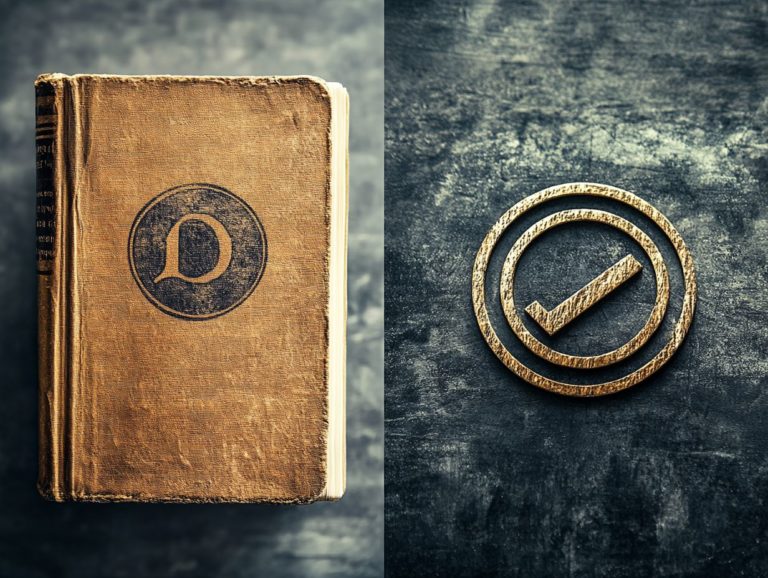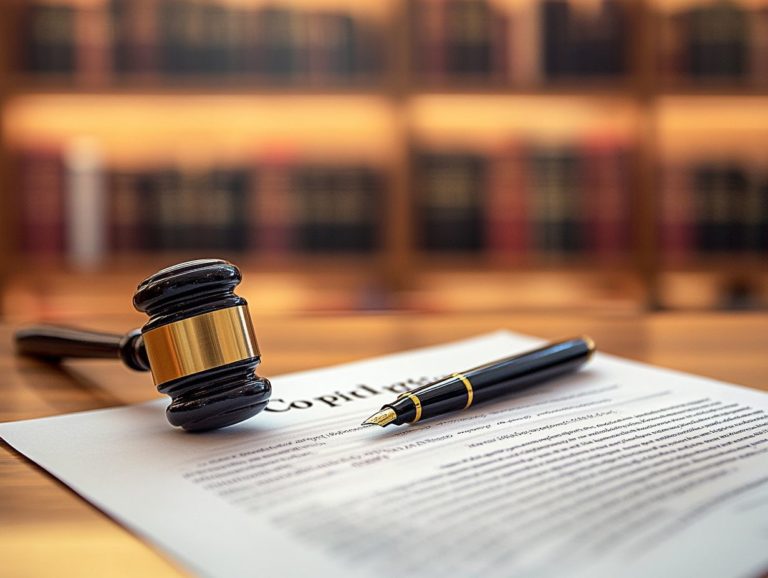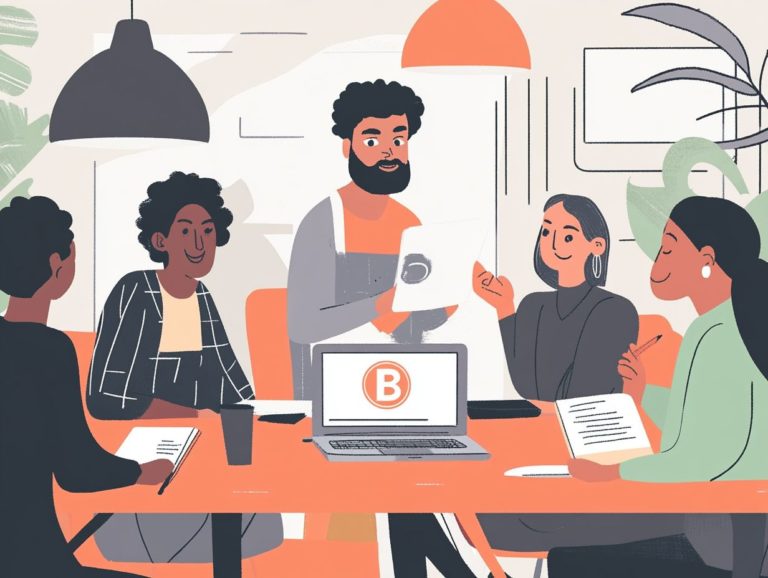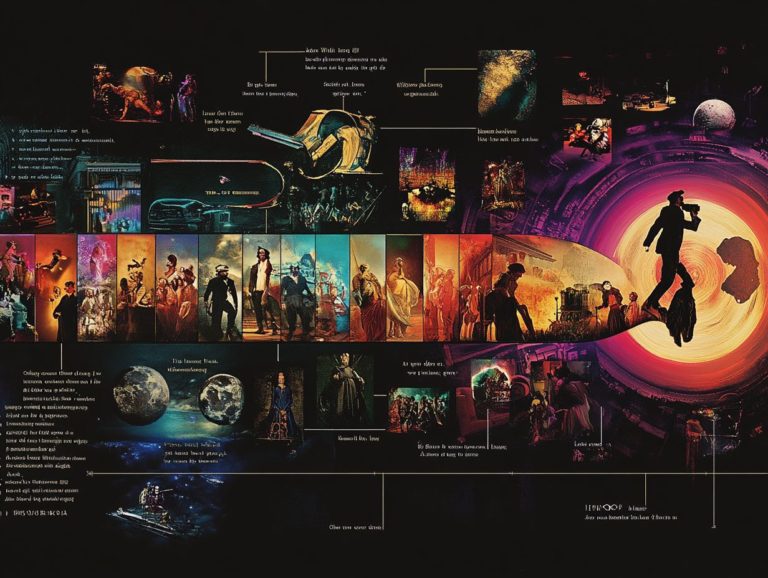The Evolution of Copyright in the Internet Era
Copyright laws have undergone a remarkable transformation since their inception, evolving in response to the ever-changing landscape of creativity and technology.
As you navigate the digital age, which is reshaping how content is shared and consumed, grasping the origins and evolution of copyright becomes essential.
This article delves into the journey of copyright laws. It examines the challenges presented by the internet, the current regulations in place, and the various types of infringement that emerge in this new arena.
You will also gain insight into the future of copyright, highlighting potential changes and the controversies that lie ahead. Get ready to explore the exciting complexities of copyright in our increasingly digital world.
Contents
- Key Takeaways:
- The History of Copyright Laws
- The Impact of the Internet on Copyright
- Current Copyright Laws and Regulations
- Copyright Infringement in the Digital World
- The Future of Copyright in the Internet Era
- Frequently Asked Questions
- What is copyright and how has it evolved in the internet era?
- How has the internet affected the distribution of copyrighted materials?
- What is the Digital Millennium Copyright Act (DMCA) and how does it protect copyrighted materials?
- How has the rise of streaming services impacted copyright in the internet era?
- What are some challenges in enforcing copyright in the internet era?
- How can individuals protect their own copyrighted materials in the internet era?
Key Takeaways:
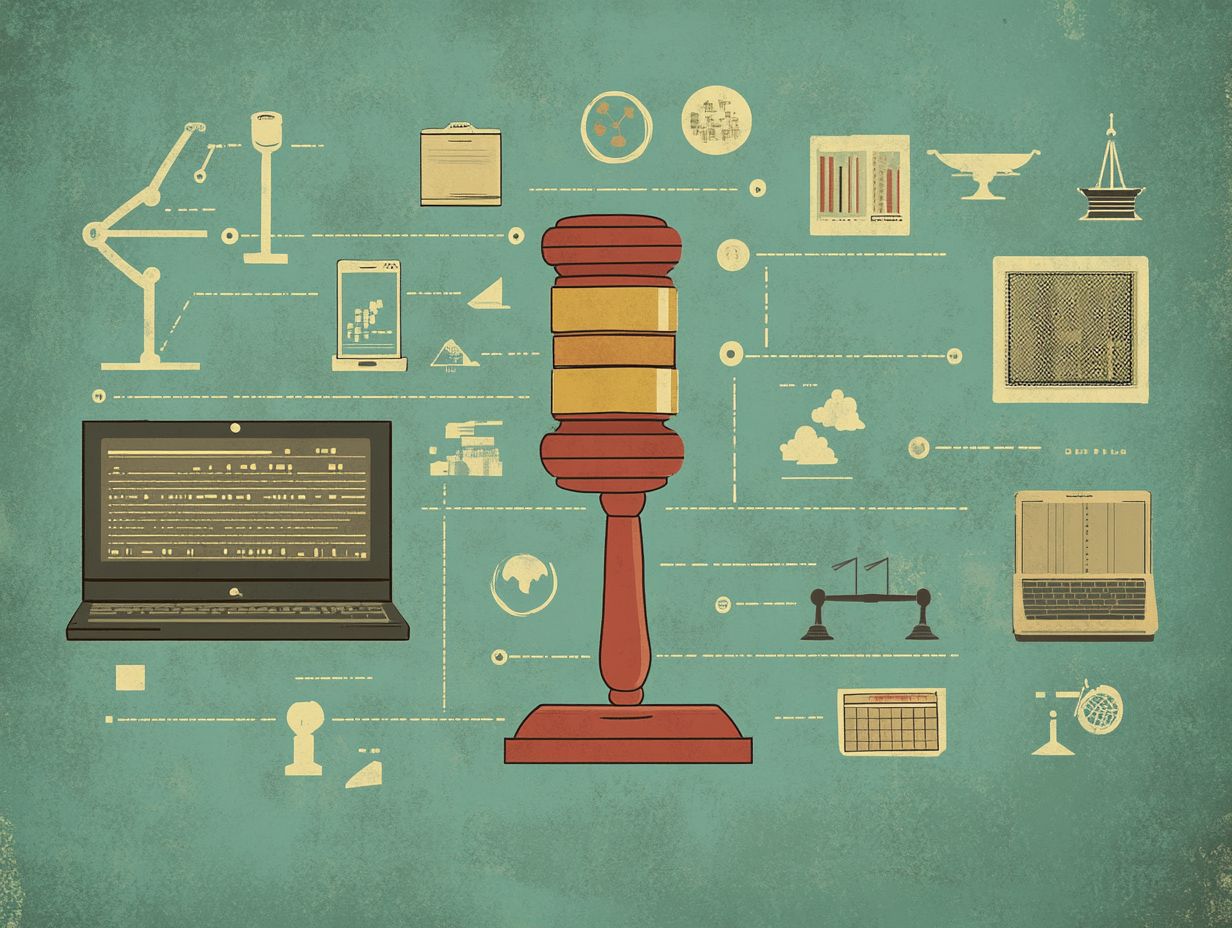
- Copyright has evolved significantly from its origins in the printing press.
- The internet presents new challenges to enforcement and protection.
- The future of copyright is likely to involve changes and controversies around regulation.
The History of Copyright Laws
The history of copyright laws unfolds a fascinating tapestry. It is intricately woven through centuries of intellectual property development that mirrors societal values and technological progress.
You can trace the evolution of copyright from early statutes designed to protect creative works to modern adaptations that respond to the future of copyright in emerging technologies.
Consider the Copyright, Designs and Patents Act 1988 and the Digital Millennium Copyright Act. These are outstanding examples of how the legal framework has transformed to safeguard the interests of copyright holders amid emerging challenges like digital piracy and unauthorized reproduction.
Origins and Evolution of Copyright
The origins of copyright can be traced back to the Renaissance. This movement arose from a critical need to protect authors and creators from unauthorized reproduction and exploitation.
Early frameworks, exemplified by the Statute of Anne in 1710, marked a significant turning point. This legislation transitioned the concept from mere privileges granted by the Crown to a more universal form of protection for all creators.
Influential figures like Jeremy Bentham and Thomas Jefferson championed the cause, advocating for robust copyright systems that acknowledged and respected the rights of creators over their original works.
As the centuries passed, copyright has evolved, expanding its scope to encompass various mediums music, literature, and digital arts.
The Impact of the Internet on Copyright
The emergence of the internet has significantly transformed the realm of digital copyright, highlighting the role of copyright in digital content. It offers both new opportunities and formidable challenges for copyright holders, legal professionals, and consumers.
As digital technology advances, copyright infringement through unauthorized reproduction is becoming alarmingly common. This necessitates a thorough re-evaluation of current copyright protection measures.
While online platforms and streaming services enhance access to creative works, they also contribute to the proliferation of digital piracy. This adds layers of complexity to the already intricate landscape of copyright legislation.
Stay informed about copyright laws as the digital landscape evolves.
Challenges and Changes in the Digital Age
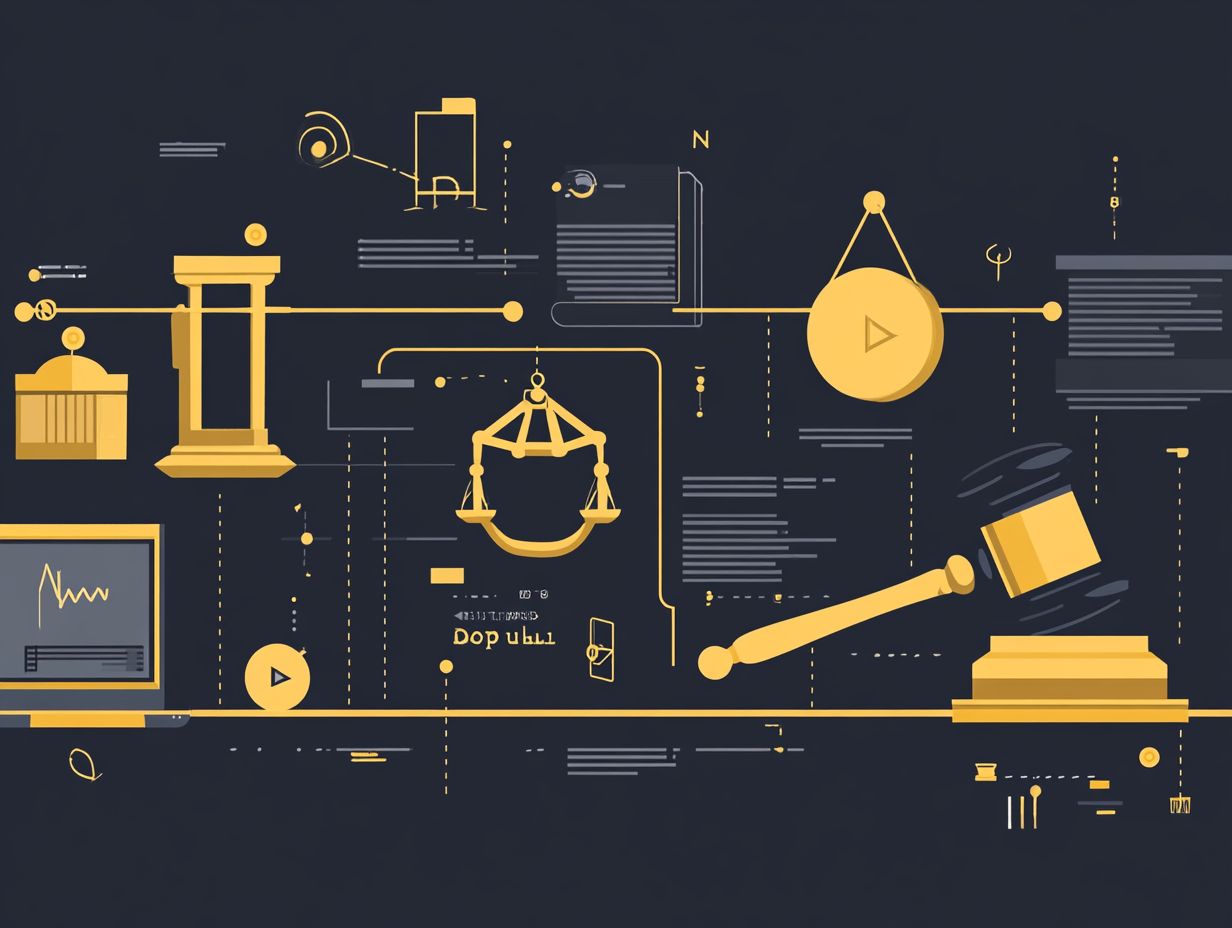
In the digital age, copyright challenges have become increasingly pronounced, particularly concerning issues like digital piracy and the ability to use someone else’s work under certain conditions without permission.
As more content is consumed online, copyright holders are facing an uphill battle against the unauthorized distribution of their creative works.
Artists and musicians often discover that their material is shared or streamed on various platforms without any form of compensation, which can seriously undermine their livelihoods.
While streaming services offer legitimate access to content, they can unintentionally fuel the fire of piracy.
The interpretation of fair use in this evolving digital landscape is still a topic of heated debate. The landmark case, Campbell v. Acuff-Rose Music, Inc., serves as an important example of how transformative uses can challenge traditional notions of copyright.
In today s environment, copyright holders must understand digital rights, ensuring they protect their creations while adapting to the ever-evolving technological landscape.
Current Copyright Laws and Regulations
Current copyright laws and regulations establish a robust framework for safeguarding intellectual property rights in today’s dynamic digital landscape.
They strike a careful balance between the interests of copyright holders and the needs of consumers and the public.
Legal professionals are critical allies, guiding you through compliance with copyright legislation and championing the enforcement measures essential to deter infringement.
Institutions such as the Copyright Office are continually adapting these laws to keep pace with the ever-evolving nature of digital media.
This ensures that copyright protection remains both relevant and effective for all stakeholders.
Key Provisions and Enforcement Measures
Key provisions in copyright law clearly outline the scope of copyright protection, detailing your rights as a copyright holder.
They provide mechanisms to enforce those rights against infringement.
These provisions form a vital framework that ensures you retain control over your original works.
They grant you the authority to reproduce, distribute, and display your creations to the public.
Infringement occurs when these rights are violated without your permission, potentially leading to significant legal repercussions.
To address these violations, legal professionals employ various enforcement measures, such as legal notices to stop someone from using your work without permission and litigation.
Entities like the U.S. Copyright Office play an essential role in managing copyright registrations, further enabling you with the legal support necessary to defend your intellectual property effectively.
Copyright Infringement in the Digital World
Copyright infringement in the digital realm primarily arises from the unauthorized reproduction of creative works.
This can lead to serious legal repercussions for both individuals and online platforms.
As digital technology continues to advance, the methods of infringement have evolved.
It is crucial for copyright holders like you to remain alert against unauthorized uses of your creations.
Engaging legal professionals is key to tackling these challenges, as they skillfully navigate the intricate landscape of copyright law to safeguard your rights effectively.
Act now to protect your creative work before it s too late!
Types of Infringement and Legal Consequences
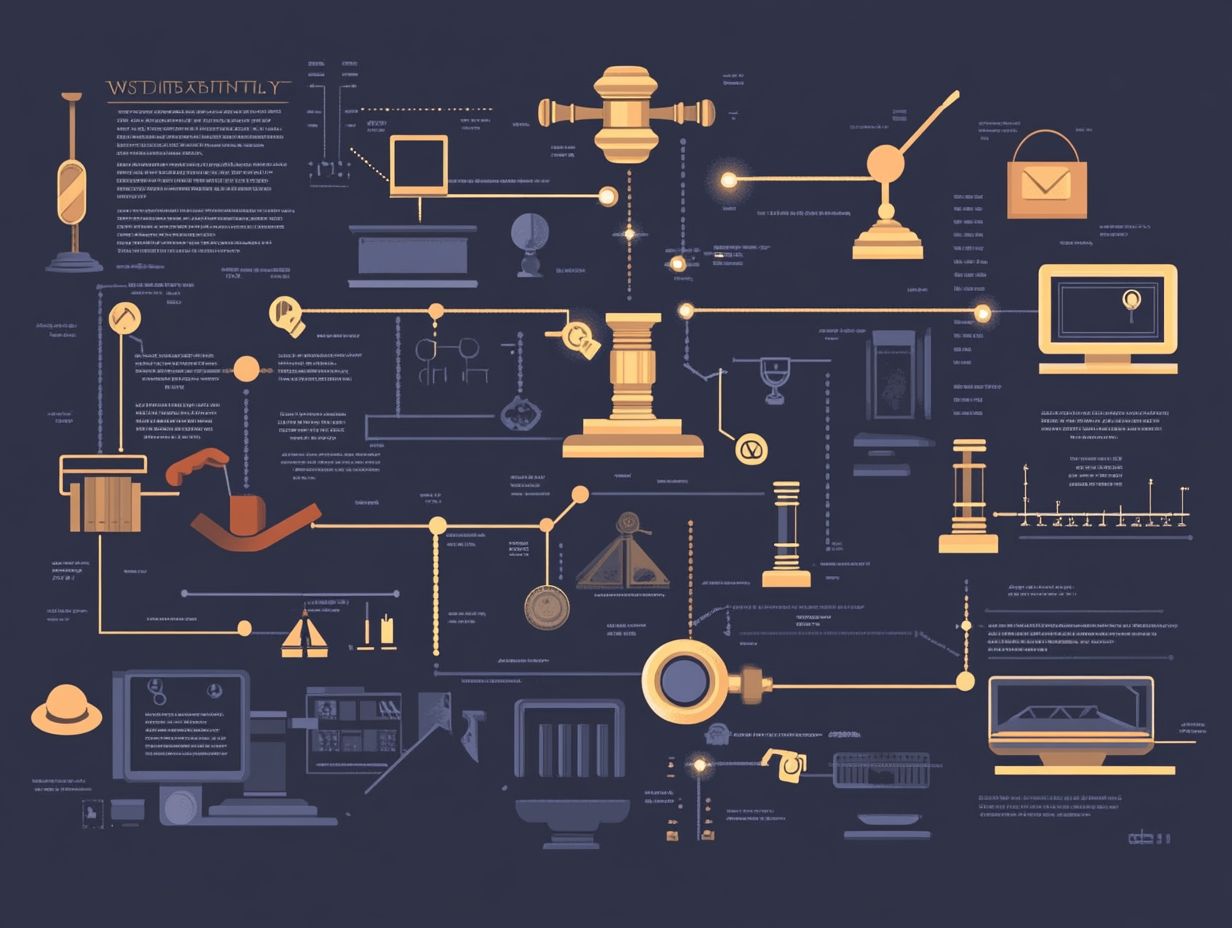
There are various forms of copyright infringement. Each carries distinct legal repercussions that can significantly affect copyright holders in their pursuit of justice.
Take digital piracy, for example. This is the illegal sharing of movies and music online. There is also the unauthorized reproduction of copyrighted materials, which often occurs in educational settings without proper licensing.
The consequences for engaging in these activities can be severe. They range from substantial fines to potential imprisonment.
Consider the case of ‘Capitol Records, LLC v. Thomas-Rasset.’ A woman from Minnesota was hit with an astonishing $1.92 million penalty for illegally sharing just 24 songs online. This case serves as a powerful reminder that the legal system is tightening its grip on copyright infringement, effectively safeguarding the rights of creators against those who would seek to undermine them.
The Future of Copyright in the Internet Era
The future of copyright in the digital age is on the brink of transformation. Technological advancements and evolving consumer behaviors are challenging traditional copyright law frameworks.
As copyright holders navigate this shifting landscape, anticipated changes in legislation are set to address ongoing controversies surrounding digital copyright and unauthorized reproduction.
Legal professionals must stay proactive in interpreting and implementing these changes. It is essential to ensure they effectively protect creators’ rights in this dynamic environment.
Predicted Changes and Controversies
Predicted changes in copyright law may lead you into uncharted waters. Various stakeholders are grappling with the complexities of digital copyright in an increasingly interconnected world.
The potential for reform already ignites discussions among those involved. Copyright holders eager to protect their creative work may welcome stricter regulations that bolster their rights in a content-saturated digital marketplace.
Legal professionals are voicing concerns about the implications of these changes. They brace for challenges in enforcement and the possibility of litigation. As a consumer, you might find yourself caught in the middle. While you appreciate access to digital content, there’s a growing unease about how evolving copyright laws could restrict your rights to fair use and sharing.
As these perspectives collide, the landscape of copyright law is poised to become a dynamic arena of debate. The consequences could ripple far beyond the legal sphere.
Frequently Asked Questions
What is copyright and how has it evolved in the internet era?
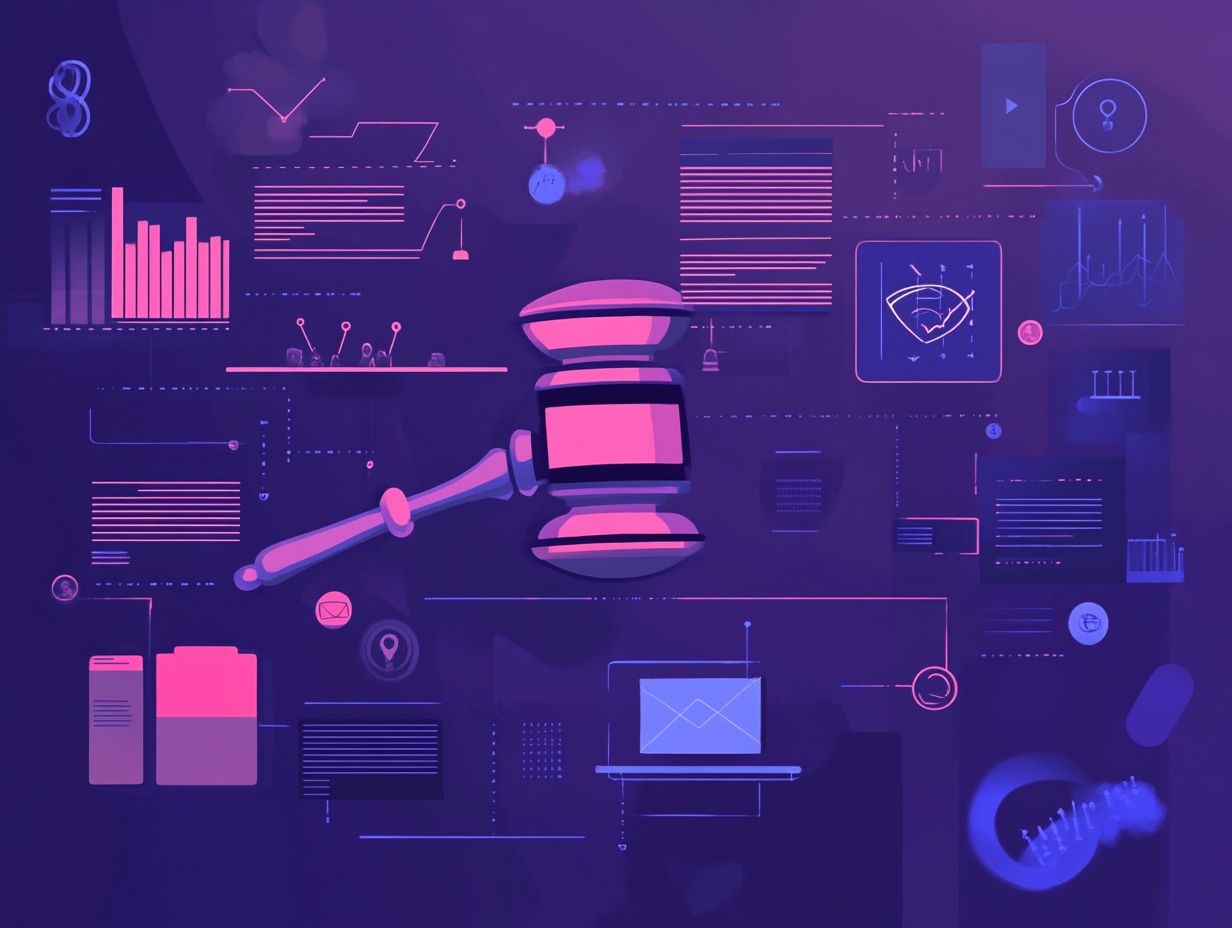
Copyright is a legal right that grants creators exclusive control over their original works, such as books, music, and movies. Today, the internet has changed how copyright works. Technology affects how we protect and enforce these rights.
How has the internet affected the distribution of copyrighted materials?
The internet has made it easier for copyrighted materials to be distributed and shared without permission. With the rise of file-sharing platforms and social media, creators find it increasingly difficult to control the distribution of their works.
What is the Digital Millennium Copyright Act (DMCA) and how does it protect copyrighted materials?
The DMCA is a U.S. law that provides legal protection for copyright owners in the digital age. It allows copyright holders to request the removal of their content from websites or platforms that violate their rights.
How has the rise of streaming services impacted copyright in the internet era?
The rise of streaming services has changed how we consume media and affected copyright. Platforms like Netflix and Spotify must obtain proper licensing and distribution rights for the content they offer. This ensures creators are compensated for their works.
What are some challenges in enforcing copyright in the internet era?
The internet offers vast digital content that is easy to share. However, this makes it hard to keep track of and enforce copyright.
How can individuals protect their own copyrighted materials in the internet era?
To protect copyrighted materials, individuals should register them with the U.S. Copyright Office. They can also add watermarks or copyright notices and regularly check how their work is used online.

